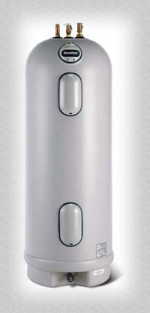Search engine visitors - click here to access entire "$ensible Home" web site
Click here to see a descriptive illustration showing several designs of new electric water heaters.
Dear Jim: I replaced the electric water heater once already and this one is leaking after only eight years. Are there any water heaters that last longer, provide more hot water for showers and use less electricity? - Ed. H.

A: There are some new conventional electric water heaters with lifetime warranties against the water tank rusting out and leaking. Others use an all-polymer (plastic) design, which cannot rust out because there is no steel in the tank, so they are guaranteed to never become leaky.
When purchasing an electric water heater, consider the tank warranty. The least expensive models will offer a six-year warranty. More expensive, top-of-the-line models often offer a 10- or 12-year warranty. These all use a standard glass-lined steel water tank inside an insulated steel jacket.
All-polymer (plastic) water heaters are also one of the most energy efficient. The inner molded tank is a test tube shape. The outer shell is made of tough polyethylene, similar to a garbage can. The wide gap between the tank and shell is filled with thick insulating foam. With the test tube shape, there is extra insulation thickness at the top where the water is hottest.
An electric water heater, unlike a gas model, is a very simple device. Nearly all of the electricity used by the two elements goes to heating the water. The difference in the efficiency levels (operating costs) of various models depends upon the amount of tank insulation and heat loss from the tank.
If you have time, you can research and compare their insulation levels. An easier method to compare the operating costs is to compare their EF's (energy factors). EF's range from about .80 to .96. For an average family, installing a model with the highest EF can save up to $100 annually. Water heaters also have yellow energy labels to help you determine the savings.
If your family uses hot water mainly during morning and evening, select a water heater with a built-in timer. It shuts off the heating elements when hot water is not needed to reduce operating cost by 15 percent. Automatic energy-saver controls are another option for regular water usage patterns.
Unless you select a new water heater with a larger tank, you will not get much more hot water for morning showers. An efficient model with a higher EF will not necessarily produce more hot water. Some models have optional higher-wattage heating elements for greater hot water volume.
The hot water output from a water heater is indicated by its FHR (first hour rating). This is the number of gallons of hot water it can supply in one hour in the morning. This is a function of how large (in gallons) the tank is and how much additional water the elements can heat in one hour.
Instant Download Update Bulletin No. 647 - buyer's guide of 11 manufacturers (50 models) of super-efficient and never-leak electric water heaters, gallon capacities, energy factors, tank and parts warranties, insulation thickness, electronic safety/timer controls, a worksheet to estimate peak hour hot water demand and a savings/payback chart.
Dear Jim: I don't keep the freezer compartment in my refrigerator very full. When I open some items, I notice ice crystals inside. Is the self-defrosting feature causing the food to thaw and refreeze? - Mike C.
A: There are two possible causes of the problem. The self-defrost feature does allow the freezer to warm up periodically to melt the frost. It should not get warm enough for long enough to defrost food though.
You may not have the freezer temperature set low enough, so some foods actually do partially thaw during the defrost cycle. The freezer may also be malfunctioning and running the self-defrost cycle too long.